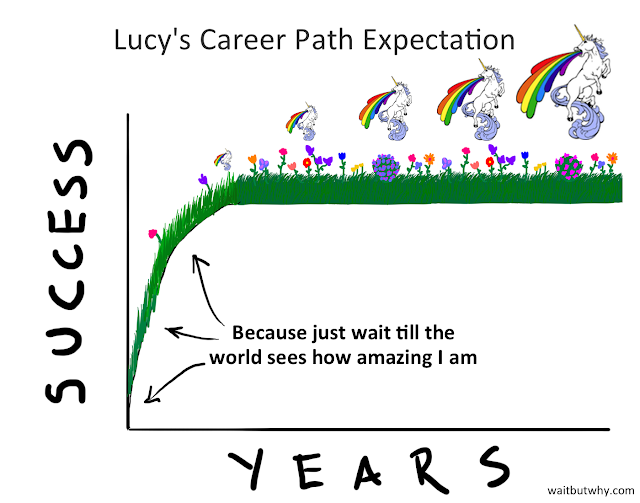In an internet sea of crap and kittens, a couple nuggets of truth have floated to the surface recently. Both nuggets are aimed at a fairly specific target audience: young people entering the workforce. This is a particular interest of mine, as I love working with our Sparkbox apprentices, and I’ve been intentionally working with newer talent throughout my career.
These recent truth bombs—which I’ll explore in detail below—hit me pretty hard. They both challenge some foundational concepts that we post-Baby Boomers have been taught, atomic elements of the world view we’ve been raised on.
The first blow to the Generation X and Y collective egos came from waitbutwhy.com and blew up on the Huffington Post:
Why Generation Y Yuppies Are Unhappy
I love this article. Not in a vindictive, “Yeah, tell those other people what’s wrong with them,” sort of way. More in a, “So that’s what we’ve been missing,” sort of way.
You must go read the full article (later), but let me give you a quick synopsis from the article itself:
I have a term for yuppies in the Gen Y age group—I call them Gen Y Protagonists & Special Yuppies, or GYPSYs. A GYPSY is a unique brand of yuppie, one who thinks they are the main character of a very special story...
...Baby Boomers all around the country and world told their Gen Y kids that they could be whatever they wanted to be, instilling the special protagonist identity deep within their psyches.
It’s the “Follow Your Passions” and “You Can Be Anything You Want To Be” speech that we heard in every elementary school convocation or high school graduation speech. It’s the rationale that supposes such rosy ends that all means are justified.
Go to college. Pull out whatever loans it takes to get the experience you deserve. Get a degree in whatever fulfills your foolish, inexperienced teenage dreams. Before you’re old enough to be off your parents’ insurance, your life and career will be rainbows and unicorns.

But, as most find out fairly quickly, that can be terrible advice as the rest of the world doesn’t care about your “special story” and doesn’t fall in line with the narrative where you inevitably come out on top. In fact, the first time the world notices you at all, you’ve just recently hit drinking age, and you’re begging for a job in a slow economy saddled with five or six figures in student loans and a degree in Hopes and Dreams. Good luck with those unicorns.
I’m not writing this to be a jerk. I say it as a warning. I’m concerned. This is happening to 20 and 30 something’s constantly right now, and few are addressing the problem.
Enter Mike Rowe, the Voice of Working America
The second piece of internet wisdom is a bit more hopeful and comes from Mike Rowe of Discovery Channel’s Dirty Jobs fame. It hasn’t gained as much traction until recently, and I suspect it only now is getting eyeballs because Mike ticked off conservatives by going on Bill Maher and annoyed liberals by talking with Glenn Beck. That tends to stoke the interweb flames.
Essentially, Mike Rowe is putting on a one-man PR campaign for hard work. He’s been pushing the agenda for several years now. In 2008, he gave a Ted talk about it. More recently, he has set up the mikeroweWORKS Foundation “concerned with promoting hard work and supporting the skilled trades,” which he promotes through Profoundly Disconnected.
I love what Rowe is doing because it can address so many problems for younger people entering the workforce that are diagnosed in the first article I mentioned. I also feel drawn to it because it aligns surprisingly well with how the web is built, how Sparkbox runs, and why we bring in apprentices.
Vastly Different Trades, Yet Not So Different
In general, Rowe is waving the banner for “dirty jobs”—the skilled trades mostly—that are no longer revered in our country. However, I still feel so connected to his message, and I’m beginning to understand why.
Rowe is an evangelist for hard work. Not necessarily following passions, but instead following opportunity and bringing your passion with you. He preaches self-reliance, responsibility for one’s education, and pride in building a product.
Other than the fact that working on the web is largely unphysical labor (and definitely not dirty), there are far more similarities than one might think. To highlight a few:
Four-year programs don’t really exist to produce a metal worker or a web worker.
Demand is high and growing for web development as well as skilled trades (contrary to popular belief), yet supply of good talent is painfully low. Good money is available for both.
Both are focused on building things, building them right, and building them as efficiently as possible. Pride lives in not only the product of your work but in the way that it’s built.
Those that are attracted to the web and skilled trades have a similar drive. They aren’t afraid to figure it out on their own, they value their independence, and they want to be given responsibility and the opportunity to show that they can create something great.
Create Opportunity
In the end, I just want to encourage those preparing to enter the workforce. Don’t just blindly follow the expectations that others have set out before you. Your parents, teachers, and friends may have the best intentions, but they may be regurgitating outdated advice.
There are some great ways to make a living out there that lead to a life that is fulfilling, profitable, and within reach without massive student loan debt. Whether it be through short trade school degrees or web apprenticeships, good stuff tends to happen for those that are driven and work hard.
And web shops out there, please consider opening your doors to more interns and apprentices. You’ll be glad you did.

